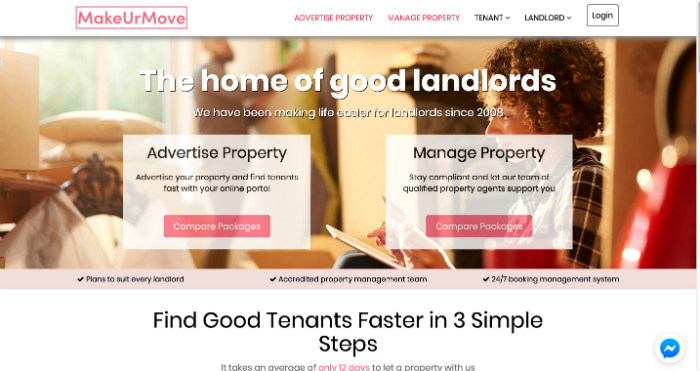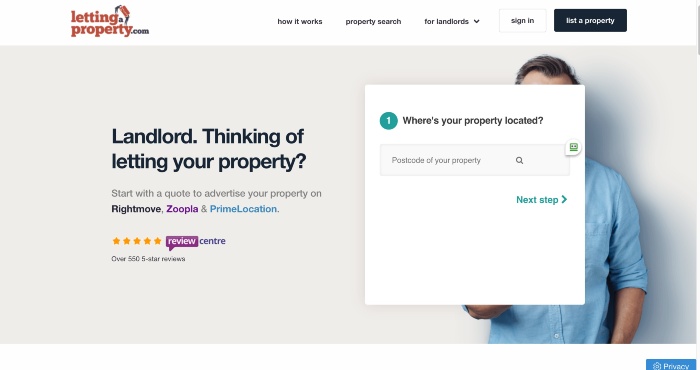Being a landlord can be stressful, especially if you have more than one tenant. Using a letting agent can take some of the stress off you – but who should you use? Find out which are the best online letting agents for landlords.
Online letting agents have gained in popularity in recent years, mainly because they offer a cheaper price. The services of an online agent are basically the same as a high street one, but without the physical presence.
But with our lives having moved mostly online, most prospective tenants look for rental properties online. Therefore, a physical presence becomes less important. Online agencies also provide you with handy online tools that can help you stay in control.
This means that growing numbers of landlords prefer to use an online letting agent to advertise their rental property and help them run it on a day-to-day basis. So in this article we tell you how to find the best online letting agents for your portfolio.
The best online letting agents – at-a-glance
With so many excellent online letting agents available today, you may find that our quick at-a-glance comparison table will help.
Our Top-Rated Online Letting Agents:
| Estate Agent | Cheapest Package | Range Of Extra Services | Our Rating | Review | Official Site |
|---|---|---|---|---|---|
 | £39 p/m | Good | 9.4 | Read Review | Visit Website |
 | FREE | Good | 9.3 | Read Review | Visit Website |
 | £30 p/m | Excellent | 8.9 | Read Review | Visit Website |
There are more details on the Property Road online letting agent reviews page but here’s a snapshot of what the best ones offer:
Lettingaproperty.com (Rating: 9.4)
With packages starting at £39 per month, this is a budget-friendly offering and their packages offer value for money. Landlords also get a wide range of extra services to select, including the collection of rent.
It’s not the best known of the online letting agents available, but our team gave them a rating of 9.4.
OpenRent (rating: 9.3)
There’s the enticing prospect of their cheapest package being free, plus free trials of their paid offerings help to make this a very attractive prospect. The extra services are also reasonably priced.
The Property Road team rated OpenRent at 9.3, with the major downside of a fully managed ongoing service not being offered.
MakeUrMove (Rating: 8.9)

MakeUrMove is one of the first online letting agents in the UK, being started back in 2008. The platform was created by landlords for landlords, which means it will do all you need it to. They offer various flexible packages so no matter what your circumstances, you can get what you need.
Our team gave them a rating of 8.9, because there seem to be some efficiency issues with the platform, which need ironing out.
Find the one that meets your needs
Now that you know which are the best online letting agents, let’s look at how to find the best one for you. So hold your horses before signing up to the first one you like the look of.
There are several areas you should consider before you decide.
Level of service

Depending on your situation, you might look for a higher or a lower level of service. For example, let’s look at Bernard. He bought two houses to rent out as a pension investment.
He has just retired, but isn’t just ready to slow down now. So he sees managing his two rental properties as his second, albeit less demanding, career. All he really needs from a letting agent is help to find a tenant and to set up the tenancy.
Bernard will then take it from there. Now let’s look at Rashid. He started his property investment career over a decade ago and has built up his rental portfolio to over 20 properties across the country.
Having recently decided to take it a bit easier and spend more time with his family, Rashid is looking for a letting agent to take off a good chunk of his work. While he still wants to know what is happening, he doesn’t want to be involved in the day-to-day business any more.
As you might have guessed, Bernard and Rashid have completely different needs that their chosen online letting agent has to meet.
Of course, these two examples are extremes, so most landlords are probably somewhere in between. What’s important is that you know what services you want and which you don’t want.
Then you need to check the various packages of the best online letting agents to see which one will suit your needs best. What you don’t want is ending up with a package that contains services that you won’t use.
Costs

The next factor you should consider is costs. As a landlord you want to make a good profit, just as other investors. Keeping costs down is one way to do that.
So when you are looking to get a letting agent, you don’t want to pay more than you need to. This means the best online letting agent for you is the one that offers the level of service you need at a price you can afford.
Let’s go back to Bernard and Rashid. Bernard is probably best off looking at letting agents that offer an advertising-only package, where he can pay a one-off fee to get his rental properties advertised.
While Rashid will want to look at online letting agencies that offer full management services and compare prices.
Although both are likely to want to keep costs down, we wouldn’t advise just going for the cheapest option. It’s a balance between the level of service and costs.
A free advertising-only offer might tempt Bernard, but if his rentals won’t be advertised on the big portals, such as Rightmove and Zoopla, it could take longer to find tenants.
Equally, Rashid might just opt for the cheapest full management-package out there, but it might not be the best one for him. He might be paying for services he won’t use or miss ones he does need.
So while costs are an important factor, it’s important to keep in mind that the cheapest offer might not meet your needs as well as a slightly more expensive one.
Technology
One of the advantages of choosing one of the best online letting agents is that they provide landlords with technology to help them manage their rental portfolios better.
These tools range from a dashboard to organise viewings to a maintenance reporting app and even a platform that lets you see where in the process your rental is.
Many of these tools will make your life as a landlord easier, no matter how much you want to be involved in the process.
Rashid for example will like to have an overview of the status of his various rentals, so he might decide to go for a letting agent that allows him to keep informed without having to do much.
Bernard, on the other hand, isn’t fussed about technology. Although he might appreciate some digital help with keeping up with viewing appointments.
As you can see, technology can make a big difference, so you shouldn’t forget about it when looking for the best online letting agent for you.
Trust

Another factor you should consider, if you are looking for an online letting agent to manage your portfolio of rental properties, is trust.
That’s because they will be handling your affairs and even signing on your behalf if needed.
The relationship between an agent and a landlord is known as a ‘fiduciary relationship’. This means that it is based on trust and the agent must behave honourably without taking advantage of their position.
So, it’s a fairly common occurrence that a landlord may not be aware that their property has new tenants until after the event.
It’s important that you choose a letting agent that you feel comfortable with and trust. Rashid will definitely want to make sure the agency he chooses is one he can trust, as he is looking for them to fully manage his portfolio.
While Bernard won’t use a letting agent to manage his rentals, he still wants a firm that he can trust to advertise his properties appropriately. Although online letting agents don’t have a physical office you can visit, you can call them. By speaking to them, you can see how you feel about them and if you trust them.
Reviews
The final factor to consider is customer reviews. Check what other landlords think about their service. This will give you a good idea of what to expect.
What we really like about customer reviews is that they are from people who have used the letting agencies. Seeing positive reviews will give you the confidence you need to decide on a letting agent that works for you in terms of level of service and price.
It’s also a way to find out if they are trustworthy. But don’t be put off by negative reviews. Of course, if the majority are negative that’s a red flag.
But no company is perfect and things can go wrong. So negative reviews are just part of it. What’s important is how the agency reacts. If they reply to bad reviews and try to solve the issue, then that shows that they care and want to provide a good service.
This is what we always look out for when we check customer reviews. But reviews can also tell you what it’s like using a specific letting agency. The reviews often mention things the landlord likes about the service.
So customer reviews are a good source of information when you try to decide on which letting agent to use.
A summary – Finding the best online letting agents for landlords

So there you have it, this is how to find the best online letting agents for landlords. We have done the leg work for you and found the online letting agencies that offer the best services at reasonable prices.
All you have to do now is to decide which of them is the best one for you. You will have to consider several factors:
- What level of service do you need?
- What is your budget?
- What technology would help you manage your rentals easier?
- Which letting agent do you feel you can trust?
- What do the reviews say?
By answering your questions you will get a good understanding of what you need from a letting agent. And this will help you to decide which is best placed to meet your needs.
A letting agent can take off a lot of stress and work from a landlord. And even though there are costs involved, for many landlords these costs are worth it.






